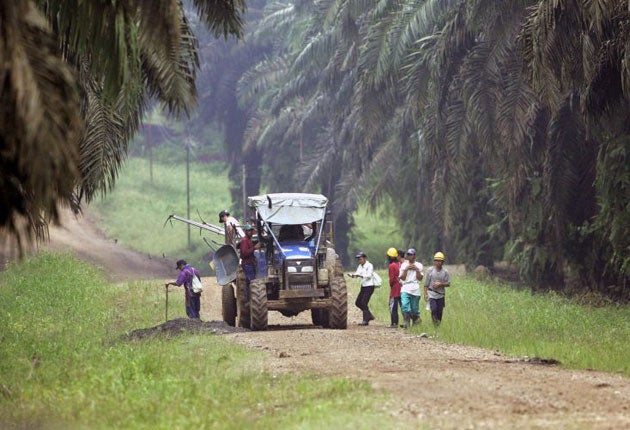If you want to build back greener, take a leaf out of Indonesia’s book
The country’s efforts to reduce the loss of tropical forests will have an impact not just domestically but for the whole world


Your support helps us to tell the story
From reproductive rights to climate change to Big Tech, The Independent is on the ground when the story is developing. Whether it's investigating the financials of Elon Musk's pro-Trump PAC or producing our latest documentary, 'The A Word', which shines a light on the American women fighting for reproductive rights, we know how important it is to parse out the facts from the messaging.
At such a critical moment in US history, we need reporters on the ground. Your donation allows us to keep sending journalists to speak to both sides of the story.
The Independent is trusted by Americans across the entire political spectrum. And unlike many other quality news outlets, we choose not to lock Americans out of our reporting and analysis with paywalls. We believe quality journalism should be available to everyone, paid for by those who can afford it.
Your support makes all the difference.After a false start last year, 2021 is set to be a “super year” in global climate change politics, with President Biden’s Earth Summit later this month expected to renew US climate leadership, and Cop26 set to rally the world’s powers around arresting the climate emergency.
Central to that challenge is reversing the decline in biodiversity across the Earth. In March, the World Resource Institute’s Global Forest Watch released its grim annual inventory of deforestation. In 2020, the planet lost an area of tree cover larger than the UK, including 4.2 million hectares of primary tropical forests – a 12 per cent increase on deforestation the year before.
But within this dark picture, there was a chink of light. Indonesia, under President Jokowi’s leadership, has reduced deforestation for the fourth year running. The forests of Indonesia are the third largest tropical forests left on the planet. While the other two – the Amazon and the Congo Basin – continued their trajectory of forest destruction, Indonesia made steady progress toward becoming a “natural capital superpower”. This term implies a new model of economic development in which natural capital is preserved, and prosperity is built, not at the expense of these assets, but alongside them.
The reduction of the rate of deforestation in Indonesia has been delivered through hard and multi-faceted work from the Indonesian government. Permanent moratoriums on further loss of primary forest and peatlands are in place, in addition to a moratorium on new oil palm licences, initiated in 2018. The incidence of fires in peat and forest areas has fallen from 2.6 million hectares in 2015, to 296,000 hectares in 2020. 835,000 hectares of peatlands have been rewetted and reforested.
Indonesia was the first country in the world whose domestic timber legality scheme was considered sufficiently robust to be accredited by the EU’s timber import agreement, FLEGT. And at the local level, innovative programmes such as Social Forestry help communities manage their forests more sustainably.
All of this has taken place while respecting Indonesia’s role in the global commodities market, including its status as one of the foremost producers of oil palm in the world. Indonesia’s continuing challenge is to produce more oil palm, more sustainably, within the existing footprint. Incomes and yields of poor smallholder farmers have to increase in exchange for their commitment not to deforest. Indonesian palm oil companies are increasingly committed to this people-based “produce and protect” approach.
The country’s efforts to reduce the loss of tropical forests will have an impact not just domestically but for the whole world. The international community – including the governments of UK, US, Norway, and multilateral funds such as the World Bank and the Green Climate Fund – has worked in partnership with Indonesia to support its leadership in these areas.
Further major support of this kind is needed, both from public donors as well as from the responsible private sector committed to funding the purchase of carbon credits on a jurisdictional scale, as part of their science-based targets to address climate change. Up until now international climate finance has been focused on jurisdictions with the highest rate of deforestation. This has to change, so that the scale of financial flows to countries such as Indonesia are radically increased, securing protection for large tracts of intact rainforest.
At a time of pressing climate and ecological emergency, Indonesia’s status as one of the world’s mega-biodiverse countries, as well as one of the world’s largest emitters of greenhouse gases, gives it a particularly vital role in international environmental affairs. Under President Jokowi’s leadership, the country has made a series of ambitious commitments, and is demonstrating how these can be implemented. Amid the pressures for business-as-usual “growth at any cost” development to resume after Covid, they are giving real meaning to the term “build back better”.
The international community – both in the public and private sector – must deliver support at much greater magnitude to spread Indonesia’s good practice elsewhere. Meanwhile, Jokowi deserves global recognition for what the country has achieved and a real chance to shine at Cop26.
Paul Polman is chair and co-founder of Imagine, a social venture accelerating business leadership to achieve the global sustainable development goals, and chair of the Food and Land Use Coalition
Join our commenting forum
Join thought-provoking conversations, follow other Independent readers and see their replies
Comments